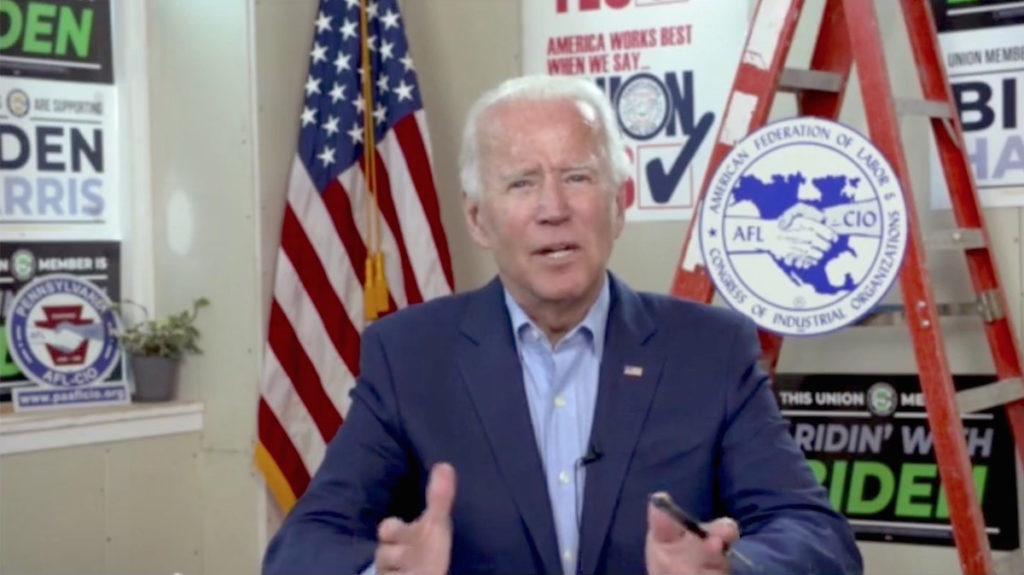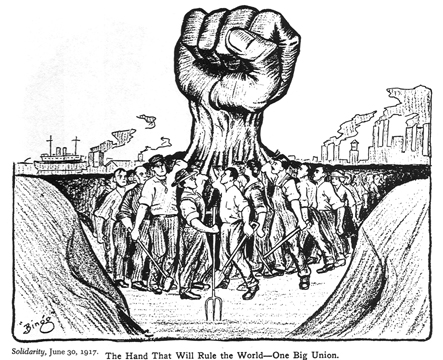Unions Regain Political Influence Under Biden
Organized labor seeks to reverse declining membership and other challenges.
This essay originally appeared in Law & Liberty on February 1, 2021 as “Union Tide Rises Under Biden” (here). Thanks to the Southeast Texas Record (here), Legal Insurrection (here), and Real Clear Policy!

President Joe Biden has for decades depicted himself as a blue-collar guy from Scranton, Pennsylvania, and part of his political persona is an appeal to the lunch bucket crowd—working-class voters. In the pivotal “battleground” states in the Midwest, many blue-collar workers are represented by labor unions, so it is no surprise that Biden’s presidential campaign focused on the union vote. NBC News reported that “Biden’s campaign began at a union hall in Pittsburgh, a city with deep ties to organized labor, and it ended nearby with an election-eve promise to be ‘the most pro-union president you’ve ever seen.’” His campaign platform was a wish list of policies favoring labor unions.
The gambit worked. The Wall Street Journal reports that “Democratic candidates in the 2020 election cycle received more than 87% of the $74 million donated by labor PACs and union-affiliated individuals, according to the nonpartisan Center for Responsive Politics.” According to NBC News exit polls, Biden won 56 percent of union households to Trump’s 40 percent, doubling Hillary Clinton’s 8 percentage-point margin among the group four years earlier. Having delivered money and votes for Biden, organized labor expects Biden to honor his pledge to govern as a pro-union president. After being out of political favor during the Trump administration, union leaders are counting on Biden to help stem the long decline in union membership and influence. Within days of his inauguration, Biden was already delivering.
Biden nominated Boston Mayor Marty Walsh, a former President of Laborers’ Union Local 223 and head of the Building and Construction Trades Council, to be his Secretary of Labor. Walsh will be the first union leader to head the Department of Labor in nearly 50 years. Biden quickly signed executive orders restoring collective bargaining rights for federal employees. In a confrontational move that was hailed by union leaders, Biden demanded the resignations of National Labor Relations Board General Counsel Peter Robb and his deputy, and fired them when they refused, even though Robb’s four-year term did not expire until November 2021.
Unions hated Robb for what they perceived to be his anti-worker interpretations of the National Labor Relations Act, the enforcement of which is entrusted to the discretion of the NLRB’s general counsel. In cases involving ride-share drivers, college athletes, and graduate students, Robb had concluded that the legal protections of the NLRA—especially the right to organize into unions and to collectively bargain–did not extend to independent contractors and non-employees. Robb also declined to hold franchisors such as McDonalds responsible for the employment practices of its hundreds of independent franchisees. Firing an NLRB general counsel during his term was viewed by business advocates as a breach of historical norms. The U.S. Chamber of Commerce condemned the move, as did congressional Republicans.
Rep. Virginia Foxx (NC), the ranking Republican in the House Education and Labor Committee, said the “outrageous ultimatum” to Robb was a reward to “Big Labor.” Foxx urged Biden to pull back “this ill-advised and divisive action against a Senate-confirmed official and allow General Counsel Robb to finish the job he was appointed to do independently and free from political influence.” Senate Minority Leader Mitch McConnell (R., Ky.) criticized Robb’s removal, calling it “unprecedented” because the termination came before the end of the general counsel’s term. In contrast, union leaders rejoiced. “Robb’s removal is the first step toward giving workers a fair shot again, and we look forward to building on this victory by securing a worker-friendly NLRB,” declared AFL-CIO President Richard Trumka.
Biden has called on Congress to raise the federal minimum wage to $15 an hour. Without repealing the filibuster, it is uncertain how much pro-union legislative action will be feasible in the evenly-divided Senate, but union leaders are hopeful that, with Biden’s support, significant reforms will be enacted. In particular, organized labor supports renewed passage of the Protecting the Right to Organize Act (or PRO Act). The PRO Act would weaken state-level right-to-work laws, which prohibit unions from compelling membership as a condition of employment, and block firms from replacing striking workers, among other measures. The PRO Act passed the House in 2020. Opposed by Republicans and business groups, the controversial legislation was not taken up in the Senate. The PRO Act would dramatically alter the rules for conducting union representation elections by, among other things, prohibiting employers from participating in (i.e., opposing) union elections in the workplace.
The PRO Act will be a major source of contention in Congress in 2021. Biden backs the PRO Act, but the U.S. Chamber of Commerce and other business groups adamantly oppose it because, according to a Chamber spokesman, “It’s a pretty dramatic change to labor law and one that makes the entire process tilted in favor of unions as opposed to striking the balance between the parties that the National Labor Relations Act has always tried to keep in place.” Opponents believe that the PRO Act faces a more uncertain path in this Congress than last year, following the narrowing of the Democratic House majority and amid a closely divided Senate.
Labor unions clearly have an ally in the White House, and are hoping for a reversal of their declining fortunes. Politico quotes one union leader: “‘It’s clear to me it’s going to be the most significant pro-labor, pro-worker administration in a long, long, long time,’ said Harold Schaitberger, president of the International Association of Fire Fighters — the first union to endorse Biden during the Democratic primary.” But is it too late?
Union membership in the private sector has plummeted. Unions increasingly rely on “card checks,” neutrality agreements, and corporate campaigns to secure representation because they often lose secret ballot elections conducted by the NLRB (when they can even muster enough employee support to compel an election). Increasing the number of unionized public employees is not going to restore the labor movement to its prior position of power and influence. Gimmicks such as organizing college athletes, graduate students, and independent contractors (such as Uber drivers) will not reinvigorate the once-robust labor movement.
As I wrote here in 2016, “The truth is, economic changes since 1935 have made union representation less attractive for American workers. No amount of regulatory chicanery can alter that.” Expect plenty of fiery rhetoric from union leaders in the coming months, but little in the way of major legislative reform.

































